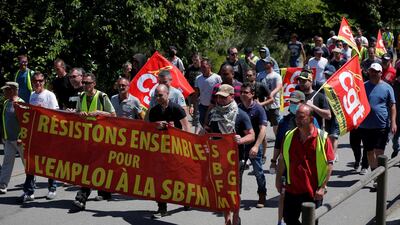The European Commission is proposing an unprecedented recovery fund to help countries weather a coronavirus-triggered recession.
The commission has backed a new €750 billion (Dh3bn) recovery programme called Next Generation EU. It also wants to revamp the EU budget to raise an additional €1.1 trillion from now until 2027.
An initial assessment indicated that at least €1.5tn of additional public and private investment will be needed.
European Commission President Ursula von der Leyen said the plan would level the playing field between richer and poorer EU nations.
"We either all go alone, leaving countries, regions and people behind and accepting a union of haves and have nots. Or we take that road together, we take that leap forward. For me, the choice is simple: I want us to take a new bold step together," she said.
The fund will be mostly made up of grants and tied to the 27 member nations' common budget.
The proposal made by the EC needs the backing of all member states to proceed.

“To get the economy moving again, confidence must return. People need to trust the places they work, buy and socialise in. They need to have certainty and peace of mind when it comes to their livelihoods and their future,” the Next Generation document reads.
"The massive investment needed to kick-start our economies must relieve the burden on their shoulders, not make it heavier. This is why the EU's recovery plan must guide and build a more sustainable, resilient and fairer Europe for the next generation," it added.
Early EU estimates show gross domestic product dropped by 15 per cent in the second quarter of 2020, compared with the same period in 2019.
The EU economy is expected to shrink by seven per cent this year.
But the document, published on Wednesday, also warned a worst-case scenario could see the economy contract by up to 16 per cent.
Unemployment, it says, could hit 9 per cent, which will be felt most among the young and low-skilled.
"This is our defining generational task. The investment we make … will not only help kick-start the economies and support workers, companies and regions today. It will invest in the future and make us more resilient so that we emerge stronger and further forward than before" the document says.


